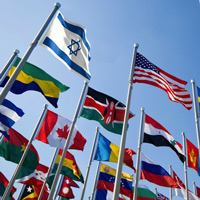Is national pride to be celebrated or feared? Is “national interest” a noble idea? Do nations have a future—and should they have a future? Or is the world moving toward a new age of cosmopolitan internationalism, trans-national ideologies, and sub-national tribalism? Are deeply felt national histories so easy to forget, and is it really desirable that they be forgotten?
 Led by Dr. William Kristol, editor of The Weekly Standard and one of the leading public intellectuals in America, this institute will examine the political and moral questions surrounding nationalism and nation-states. The course will begin by examining the case for and against nationalism, drawing upon some of the major works of modern political theory. It will then look in detail at three “regimes”—Europe, America, and modern Israel—drawing upon a mix of classic texts, speeches, and case studies.
Led by Dr. William Kristol, editor of The Weekly Standard and one of the leading public intellectuals in America, this institute will examine the political and moral questions surrounding nationalism and nation-states. The course will begin by examining the case for and against nationalism, drawing upon some of the major works of modern political theory. It will then look in detail at three “regimes”—Europe, America, and modern Israel—drawing upon a mix of classic texts, speeches, and case studies.
In Europe, we see the dominant moral and political idea of our age—“human rights”—in its most advanced form. All persons everywhere are entitled to equal dignity and equal protections. The most dangerous threats to human rights—terror and empire, religious extremism, natural catastrophe, market dysfunction—all transcend national borders. Human rights cannot be secured by nations, and excessive national pride is a threat to the new ideal of the free, sovereign, cosmopolitan individual. The nation must be overcome and replaced by a centralized governing body that is large enough to protect global citizens from global threats.
In America, we see the ideals of universal liberty and natural rights combined with a belief in the exceptional character and special responsibilities of the American nation. Does American power serve the interests of world order? Do Americans believe in their own exceptionalism, or do they seek to become a nation among the nations?
The question of nationalism takes on special significance for citizens of Israel, the world’s only Jewish State. Zionism is a form of nationalism, and the founding of Israel represents the culmination of ancient longings for the rebirth of Jewish sovereignty in the Jewish homeland. But it was also founded in partial response to World War II and the Shoah it perpetrated on European Jewry. If the intellectual architects of the European Union believe that the national form causes violence and stands in the way of a more harmonious world, the intellectual architects of the State of Israel believed the opposite—that only a state dedicated to the protection of the Jewish people will ensure their welfare and prosperity.
Taken together, these urgent questions invite us to think about the deepest meaning and true character of political life, returning us yet again to the great texts and thinkers who illuminated the problems of politics with greatest clarity and force.
This institute was offered in conjunction with the Hertog Foundation: hertogfoundation.
